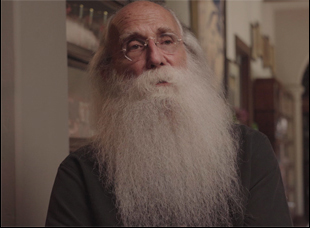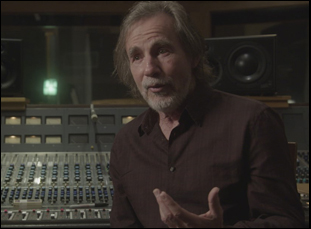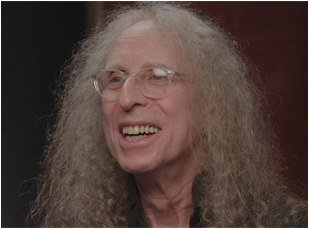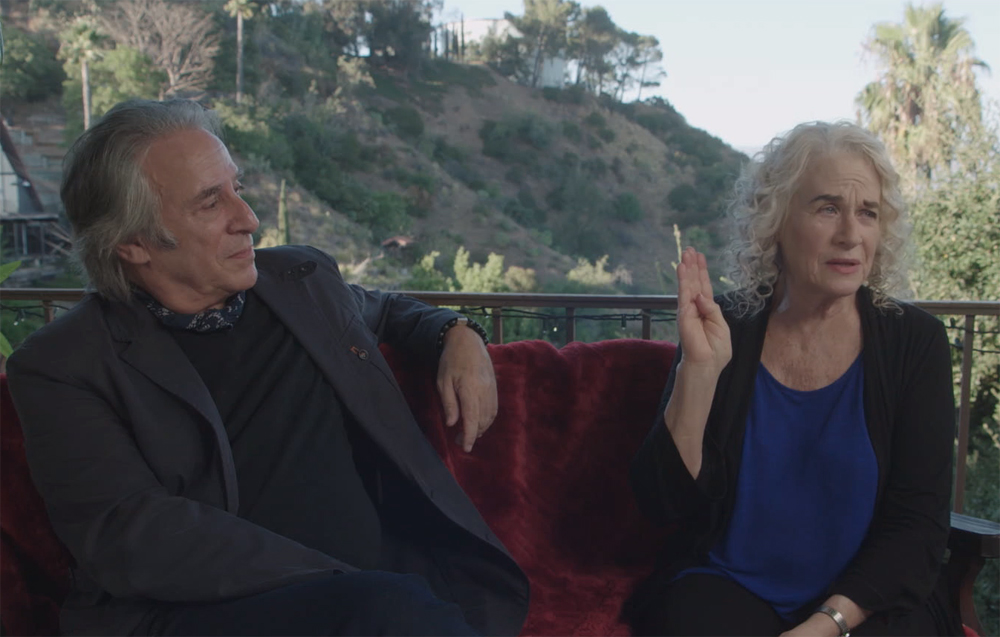When Denny Tedesco picked up a camera instead of a guitar, it might’ve been assumed that he wouldn’t be carrying on the legacy of his dad Tommy, who supported his family as a session musician. But in 2008 when he honored his late father with “The Wrecking Crew,” shining a spotlight onto the ubiquitous backing band that Tedesco played in that helped fuel some of the biggest hits of the 1960s, the director stumbled into an unexpectedly rich history that hardly ended with the Wrecking Crew’s heyday, even though the credits eventually had to roll. As he would film Billy Bob Thornton just over a decade later scouring the liner notes on the back of albums produced for the ‘70s with great aplomb where there was a good chance you’d find the names Russ Kunkel, Leland Sklar, Waddy Wachtel and Danny Kortchmar, he knew he hit pay dirt again.
In “Immediate Family,” Tedesco finds that he isn’t just depicting history but making it when the five artists who played in the background for everyone from Bill Withers to Joni Mitchell are taking center stage these days. The generation that followed the Wrecking Crew not only hopped from one studio to the next helping other artists find their sound, but joined them on tour, making the rigors of the road a part of their skillset as much as their acuity on the bass guitar or drums and as Tedesco follows the musicians as they start coalescing as a band playing for themselves, he gets them to reflect on how they helped shape the music of 1970s and ‘80s as Kortchmar’s early connection with James Taylor would lead to gigs on some of the era’s biggest albums with Carole King, Phil Collins and Don Henley. While the film celebrates the power of collaboration, Tedesco is wise to often isolate the instrumentation that his featured musicians provided to select songs, demonstrating the crucial creative choices they made and the remarkable ability they had that pulled any given track above the din of everything else on the radio.
After catching incredible stories about how certain hit songs came to be, such as the all-nighter that led to Warren Zevon’s “Werewolves in London,” as well as tales of late night poker nights on the road with Linda Ronstadt, Tedesco shared some of his own about the making of “Immediate Family” on the eve of its New York premiere at DOC NYC this week and how a pandemic pause actually helped the production and getting the best anecdotes he could from his subjects.

It’s funny because I was shellshocked after “The Wrecking Crew.” It took 19 years from the first day of shooting to getting it out by Magnolia onto Netflix, so I thought “There’s no way I’m ever going to do another music doc.” Then someone said “Hey, would you be interested in doing something on the guys that were originally known as The Section? They have a band called the Immediate Family.” I knew Leland was in it and it sounded interesting because there is a natural progression out of “Wrecking Crew,” because if you remember at the beginning [of the film], I said, “This is the story about my father and his extended family, the Wrecking Crew,” and in a sense, my dad went to work with all these guys. They spent together more time together than their own families. Then at the end of Wrecking Crew, I asked Lou Adler, who worked with them all the time, “When you did Tapestry [with Carole King], did you make a conscious decision to change it up on the sound?” He goes, “Oh no. Carole brought her friends in — James Taylor and Danny Kortchmar.” That was when the light bulb went off — it was a perfect jumping off point.
Was Danny a real partner on all of this? You see him in some of the interviews besides his own.
Oh, he is great and Carole wanted him there [for the interview]. Then we went up to see Linda [Ronstadt] together, but that was about it. But if you take Danny out, a lot of things go away. Same thing with Peter Asher. Peter meets The Beatles and then James [Taylor] goes to Apple Records because of Danny, and all these things [are] always like, “if I didn’t go out that day, I would’ve never met my wife.” Everything is tied together. And it was the same thing with Danny. Danny is the stone where they all keep coming to at the beginning.
Was it easy to find the structure when it’s so sprawling, even if there’s a touchpoint like that?
Yes and no. Growing up, I wasn’t a musician. I can’t play an instrument. I might have a guitar on the wall, but it doesn’t mean anything. But I understand growing up with musicians, so that’s basically my structure of knowing what they’re like and If I hadn’t done “The Wrecking Crew” and knew it worked, at least I had a structure of, “Okay, I know.” And it sounds crazy, but when this came around, I knew the differences between The Wrecking Crew and these guys. Dad went to work and he could do three or four sessions a day with different artists in the ‘60s because there were very few tracks and they didn’t leave. It was a factory knocking out music and the times changed. That’s when Danny and Russ and Lee and Ryan come in and I knew there were differences.
Then getting these artists was a piece of cake. Someone would make a call [to an artist] and they instantly said “Yes.” After the first meeting with the band, I pitched the idea of how I wanted to go about this, and the next day I got a call, [saying] “Carole’s in, she wants to do it in three weeks when she’s in town.” Now I had to prove what I just pitched. Sometimes you pitch an idea that’s pretty broad and then you just start finding your way through it.

Going back to “The Wrecking Crew,” don’t forget [my] dad went to work every day, so I never saw my father play. I knew he was a guitar player, but all the musicians and his friends I saw [I saw at] dinners and parties and golf and poker games. And “Broadway Danny Rose” was one of my favorite films, and the reason I loved it so much was [the framing device where] a bunch of managers are talking about Danny Rose, who is [played by] Woody Allen, bunch of managers, just talking crap about him and it’s hilarious. I love that type of filmmaking where it’s dialogue over dialogue and they’re arguing — that’s what I grew up with. If you put a bunch of musicians [together] without their instruments, they’re going to let loose. I had four cameras on dollies and you just hope that you capture it as you keep going.
The other nice thing you build on from “The Wrecking Crew” is how you’ll have the musicians show how they contributed to any given song by isolating the sound of their instrument before integrating it into the full song. How did that evolve as an idea?
For “The Wrecking Crew,” we showed 20 minutes of a cut at one point and Carol Kaye was the only one that had an instrument [with her]. Dad was gone by then. We only had [footage of] him in the roundtable, and Hal Blaine’s a drummer, so he’s not going to sit by his drums and have an interview, but someone said, “Oh, you’ve got to have more of that” and I didn’t have more of that. So I put Hal in the studio, put headphones on him, just the way you [as an audience] would’ve heard [a song] and I realized, “Oh, that’s how he does work in the studio.” So [standing outside] I have no idea what he’s listening to and then that’s why we slowly bring [the rest of the song] up. Now I knew I knew each guy was going to have their story with one of their hits at the beginning, so I already knew it was a trick that worked and what’s fun about it is people hear music differently now when they see these films. You listen to what’s Russ playing? It sounds familiar — boom, boom, boom, boom, boom, boom, and you go, “Oh, that’s ‘Rain’ [or whatever song it is],” and the fun part is we all listen to it differently now.
You also have a lot of fun with the animated recreations. What was it like to find the right style for this?
Well, it was my wife [who was] talking about animation, and you try to find the right style because I’m not an animator, but my wife said, “These guys Noah and Lewie Kloster did a short film about our friend Ali Selim,” and I checked it out and it was hilarious. And I contacted them and they were into it. They’re in their twenties, but they grew up with this music because of their parents and I said, “Here’s what we’ve got. I want to do this and this.” And they’re mixing mediums and what we would always do is find something that’s real, so when Leland pulls up into in front of a studio, which is the studio that he always worked [in] and that’s all animated, but the car is not — that’s his real car [from a picture], and he goes into the studio, and he plays bass that he calls “Frankenstein” and it’s like, “No one will know this except bass players.” And it comes off the ceiling and it’s the real bass in a sense. It was just fun.
Were there any directions this took that you might’ve been surprised by?
There were a lot of changes because originally, I wanted to call it “Immediate Family and Friends” [because] I wanted to be able to explore the other players at the time. These guys weren’t the only guys. You had the Porcaro [Brothers], you had [Steve] Lukather, you had Jim Keltner and all these guys. But COVID hit. Thank God we started when we started in 2019, and quickly we had almost all the stars done by December, and I hadn’t had the [Immediate Family] guys in the can yet, and COVID hit and the world as we all remember, stopped and it was like, “Wow, what are we going to do?” I just slowly went out with Benjamin, my DP, and my sound guy and we slowly got their stories down, and in a weird way that was better to do [those interviews] later because we trusted each other more and felt comfortable with each other. If I did their stories right off the first day [of the production], it’s just an interview. Six months later, I’m talking to them as a friend now versus an interview. if I had to do it again, I think I’d do the same thing. Just without the COVID.

The stuff in New York when we’re in a club, that was pre-COVID, but that was the first time I said, “This is the greatest thing about these guys.” They blow my mind because these guys don’t have to do this. It’s hard no matter what age you are, but starting a band in their seventies [or] whatever age you are, it’s not even starting a band, they’re not doing it lightly. They would have meetings on Fridays even during COVID [when they couldn’t be on the road], and they could have given up and walked away and they would’ve been fine. But they kept going. They created music while COVID was happening without each other. They would just talk and do a capella, and they were doing videos that kick ass and none of them were together. The first time they were together was when we did the roundtable — and we were very safe, tested and everything — but these guys killed me. They really never gave up. And they go on the road, but this is not about making money. They do it because they love it.
What’s it like getting through all of this yourself?
I’ve only shown it seven times now, and we never had it with a real audience because of COVID — the first group was the guys and Jackson Browne and they all loved it, and I went, “Oh, thank God.” As long as they loved it, we were fine. But then Peter Asher loved it and Carole [King] and James [Taylor] saw it. But it was hard not to have a real audience because you don’t know where the problems are, so our first three [live] screenings were at Woodstock, Tallgrass, and then Nashville, and we got audience awards after the first two, so I was thrilled. But they’re festivals, so there’s still this reluctance in my head to be “Okay, I feel good about it.” But I just saw it at the Cinema Society in San Diego and in Phoenix — 300 people at 10 o’clock in the morning, and they come out, they go, “Oh my God, it’s the music of my generation.” And I feel safe now and happy with it. Because as a filmmaker, you don’t want to get overjoyed, but long as these guys are happy with it, I’m okay.
“Immediate Family” will screen at DOC NYC on November 15th at 9:30 pm at the IFC Center and November 16th at 1:45 pm at the Cinepolis Chelsea.




